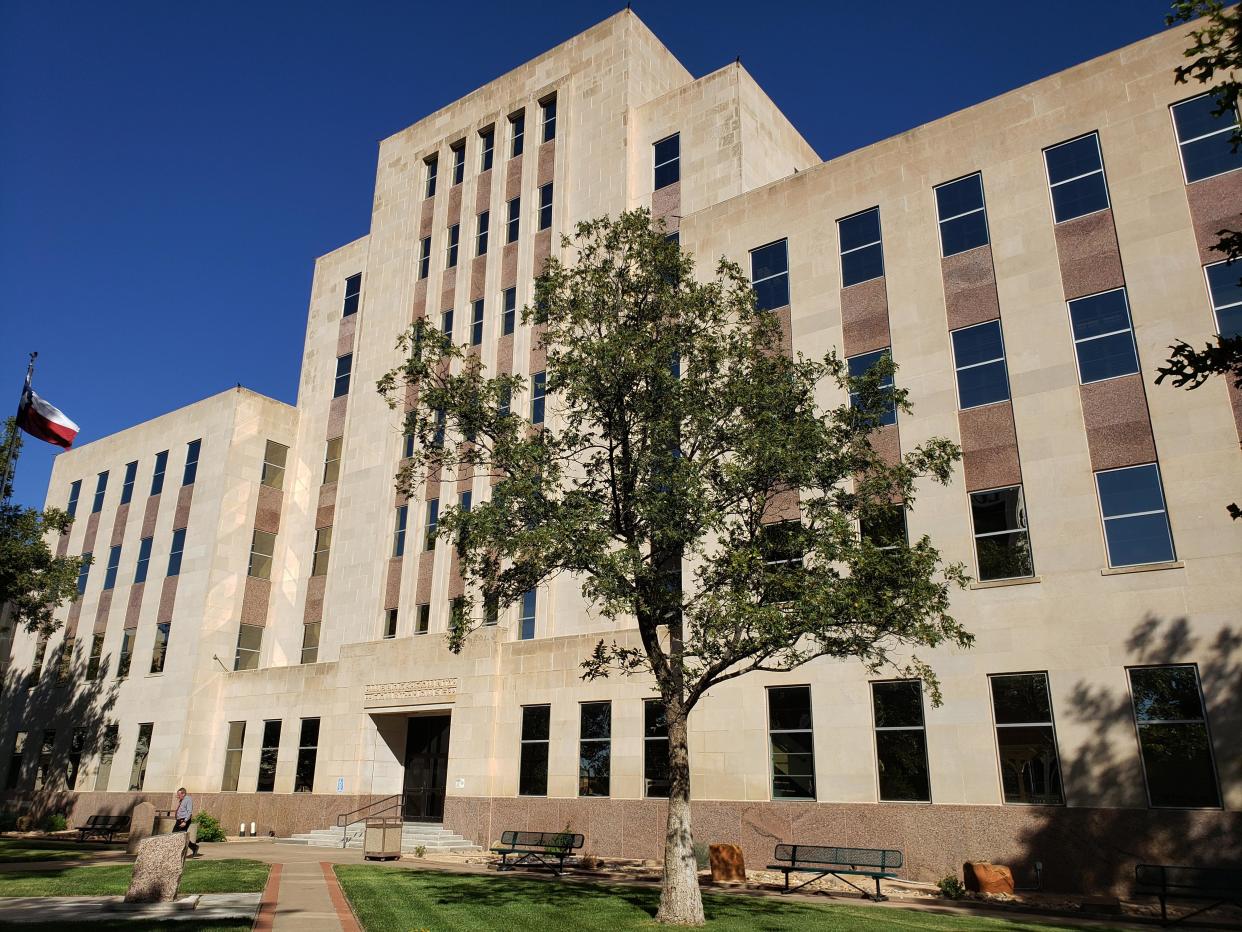Trial begins for driver in 2017 fatal wrong-way crash on South Loop 289

Family members of Jonathan Pesqueda wept in the 140th District Court as footage from a Lubbock police officer's body camera was played to jurors showing him trapped in his mangled vehicle, unconscious and unresponsive after a head-on collision on the overpass of South Loop 289.
Lubbock firefighters could be seen calmly and swiftly working to cut the roof off Pesqueda's 1985 Monte Carlo, as paramedics reached through the mangled vehicle to stabilize and treat him as best they could. A paramedic later told jurors that Pesqueda's breathing was slow and shallow and he never regained consciousness.
The footage was among a handful of videos jurors would watch on Monday in the trial of 31-year-old Alexander May, who is charged with manslaughter in Pesqueda's Aug. 3, 2017 death.
Dozens of Pesqueda's family members packed into the courtroom and watched as May, who is represented by Lubbock attorneys Chuck Lanehart and Fred Stangl, entered a plea of not guilty to a count of manslaughter, a second-degree felony that carries a punishment of two to 20 years in prison.
Prosecutor Mandi Say told jurors in her opening statement that the evidence presented at the trial will show May acted recklessly the day he crashed into Pesequeda, causing his death.
She said the evidence will show May drove his Toyota Tacoma under the influence of alcohol, failed to control his speed and yield the right of way as he drove the wrong way on the westbound lanes of the South Loop 289 overpass above Indiana Avenue. She said May also failed to apply his brakes and keep a proper lookout to avoid crashing into Pesqueda.
"(Driving) the wrong way on the Loop is no accident," Say told jurors.
She also said the investigation would reveal that Pesqueda, 18, was not wearing a seatbelt that night and had THC, the main psychoactive ingredient in marijuana, in his system. However, she said none of those facts absolved May of responsibility, saying the deadly crash would not have happened but for his actions.
Prosecutors also allege that May turned his Toyota Tacoma into a deadly weapon that night. A deadly weapon finding in the case would require May to serve half of his sentence before he would be eligible for release on parole.
Meanwhile, Stangl in his opening statement described the crash as a tragic accident and told jurors that in cases involving a death it was human nature to want to hang blame on someone. However, he asked jurors to resist the urge to base their decision on emotion.
"You have to be objective," he told jurors, "You have to put those emotions on the side. It's hard. It's tough."
He said the case before them wasn't as clear-cut as prosecutors are making it out.
"There are a lot of permutations and connotations and nuances that you're going to really pay close attention to," he said.
Under the law, a person acts recklessly if they were aware of the risks of their actions but disregard it.
Stangl said he believed the state would be unable to prove that his client knew and ignored the risks of his actions that day.
He said he believed the evidence will show the crash happened as both vehicles were approaching the peak of the overpass and could not see each other before colliding into each other.
"It couldn't have been avoided," he said. "By the time the danger was known it was too late... This was not a reckless act of manslaughter, whether or not he should have known what was happening."
Lubbock police Sgt. Jesse Akins, who was one of the responding officers at the scene, told jurors he arrived about 2:55 a.m. to find two vehicles with extensive front-end damage and were separated by a large debris field.
Akins' body-worn camera was played to jurors, who watched paramedics and firefighters work for about a 1/2 hour to free Pesqueda from his vehicle.
Pesqueda was taken to University Medical Center where he died.
May and his passenger, Cody James, were taken to Covenant Medical Center for treatment.
Jurors also heard from Jerry Britton who was part of a road construction crew working on the eastbound section of the loop the night of the crash.
He told jurors that he saw a black truck speeding as it barreled through the wrong way of the road, then swerve to avoid one vehicle before crashing head-on into another vehicle.
Lubbock police officer Lukas Rutter told jurors he spoke to May at Covenant Medical Center and, based on his interaction with the defendant, believed he was intoxicated that night. He said during his conversation with May, the nurse removed his oxygen mask and May took in a deep breath and exhaled. He said he could smell the odor of alcohol coming off May's breath.
Footage from Rutter's body-worn camera that captured his interaction with May was also played to jurors.
May could be heard telling the officer he had been drinking earlier that night. However, May was incoherent as he tried to explain what he was doing and where he was before the crash.
Rutter told jurors he suspected May was driving while intoxicated and was preparing a warrant to obtain a blood specimen for analysis. However, Rutter said he was unable to complete his application because May was moved into an operating room for surgery.
According to an arrest warrant, investigators obtained medical records several days later that showed May’s blood-alcohol level was 0.232, which is about three times higher than the legal limit of .08 percent.
May was arrested on Oct. 31, 2017 and was booked in at the Lubbock County Detention Center where he was was released on bond the same day.
The trial was postponed Wednesday because of the weather and is expected to continue Thursday.
This article originally appeared on Lubbock Avalanche-Journal: Trial begins for driver in 2017 fatal wrong-way crash on South Loop

